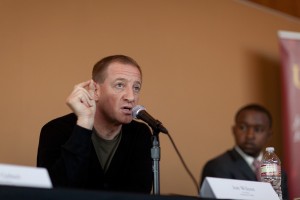Panelists debate about immigration
Wednesday’s “Students Talk Back” forum, hosted by the Schwarzenegger Institute for State and Global Policy and Jesse M. Unruh Institute of Politics, discussed U.S. immigration policies and the prospects of immigration reform passing the federal legislature.

Objectivity · Jon Wilcox, president of Multiplicity Media, gives an unbiased perspective on the controversial topic of immigration reform Wednesday afternoon at the Ronald Tutor Campus Center. – Ralf Cheung | Daily Trojan
The event included guest panelists Amy Gebert, Jon Wilcox, Christian Patterson and Teddy Davis. Gebert and Patterson, both student workers at the Unruh Institute, have previously held internships at the Sacramento Bee and at the Office of Gov. Jerry Brown. Wilcox, president of Multiplicity Media and a former Daily Trojan editor, and Davis, who was the press secretary for former Los Angeles Mayor Antonio Villaraigosa, balanced each other on the panel. Davis focused on politics, and Wilcox was more interested in an objective diagnosis of the situation.
Dan Schnur, director of the Unruh Institute, and Daily Trojan online editor Jordyn Holman co-moderated the event.
The debate began with a discussion of the Republican Party’s stance on immigration reform and its resolution to improve race relations in the wake of the 2012 elections. Patterson opened the discussion with his opinions on the House’s attempts at immigration reform.
“I think I’m a little bit more negative on that question,” Patterson said. “The Senate passed a very large bill that included a path to citizenship and more money for border security. It looks like the House is going to pass a bill that large. It seems difficult for Speaker John Boehner to get the majority of the Republicans to vote on a bill that large.”
Wilcox agreed with Patterson’s analysis that immigration reform is unlikely to surface anytime soon.
“I share [Patterson’s] gloominess,” Wilcox said. “The reason why I think this will fail in the circumstances because it is a deep, complex, emotional policy but it’s completely wrapped up in the politics.”
Wilcox also said he believes the only path to comprehensive reform is through a democratic majority.
“Realistically, the only way these things can pass is the way Obamacare passed … a non-bipartisan effort,” he said.
He said this is because the Republican majority wants minor reforms, with increased visas and more agricultural workers. Davis argued that if a Democratic majority accepts any of these minor reforms, it can compromise comprehensive reform.
“The Democrats know that the holy grail is a pathway to citizenship,” Davis said.
Davis believes that unless the Democrats strive for this “holy grail,” no real reform will pass.
In addition, the panelists stressed that state legislation is critical to passing immigration reform. Gebert cited the Trust Act, a California act that limits the sate government’s cooperation with federal immigration authorites, and new legislation that allows non-citizens to practice law. But Wilcox stated that though more liberal states will emulate California, more conservative states will emulate Arizona’s stricter sanctions.
Gebert argued against this point, saying that state legislation is a way to start a conversation about immigration reform in the federal government when controversial bills go to the Supreme Court.
Though the panelists disagreed on multiple issues, the topic of the president’s involvement in immigration reform was the most polarizing. Davis was in favor of his involvement, but the student panelists argued that Obama’s influence is limited to the Democratic Party, which already supports reform.
Thomas Armstrong, a junior majoring in history and international relations, spoke of USC’s place in the immigration debate.
“I think as a university in Los Angeles with incredible racial diversity and a growing Hispanic community … We are at the center of a potential nationwide movement,” Armstrong said. “I think the duty [of a USC student] is to be informed.”
After the event, Patterson said that the issue called for more civic participation in communities.
“I think that getting engaged and putting your voice out there for issues you believe in is part of what this country is all about,” Patterson said. “And USC students should definitely make their voices heard and organize and reach out to their elected officials.”
Next week’s forum will discuss the George W. Bush and Obama administrations’ challenges in the Middle East.
Follow us on Twitter @dailytrojan

Armstrong said. “I think the duty [of a USC student] is to be informed.”
Or is that, to be spun to…